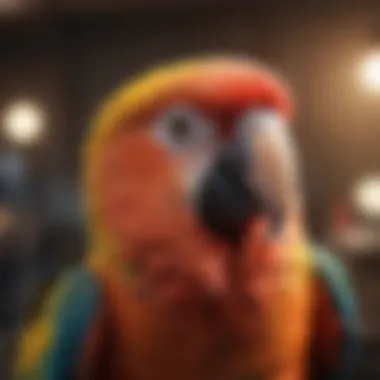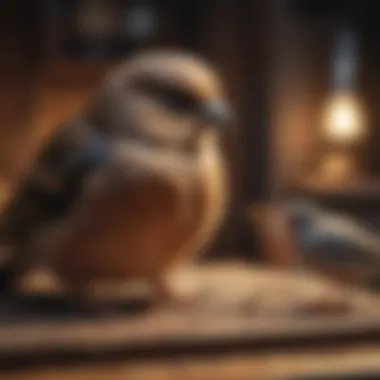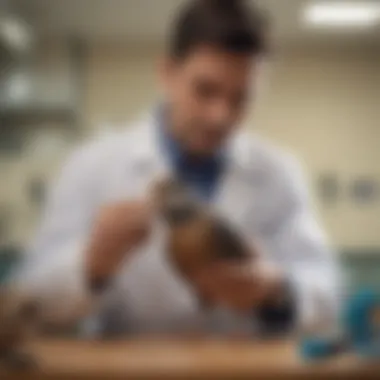My Bird is Sick: Essential Care and Solutions


Intro
Caring for a bird is a rewarding experience but can also be quite challenging, especially when illness strikes. A sick bird can exhibit various symptoms that may concern you as an owner. It’s crucial to be observant and act swiftly when problems arise. This guide offers valuable insights into understanding your pet's needs, recognizing signs of illness, and taking appropriate measures to ensure their recovery.
Understanding Your Pet
Pet Behavior Basics
Birds, like all pets, have behaviors that reflect their wellness. Healthy birds often chirp, preen their feathers, and interact with their environment. Changes in these behaviors can signal underlying issues. For instance, if your pet bird becomes unusually quiet or stops eating, these can be early indications of illness.
Common Breed Characteristics
Different bird species can display unique traits and susceptibilities. For example, parrots may show signs of illness differently than finches. Understanding these breed-specific characteristics can aid in early detection. Take time to familiarize yourself with your bird's individual behaviors and requirements.
Species-Specific Needs
Each bird species requires specific care. For instance, larger birds often need more space and social interaction, while smaller birds may thrive in a quieter environment. It is essential to research your bird’s species to adapt their habitat and care regimen accordingly. Always care for their particular needs which can vary significantly.
Health and Wellness
Routine Vet Check-ups
Regular veterinary visits are vital for monitoring your bird's health. These routine check-ups can help in detecting potential health issues even before symptoms appear. Establish a schedule that suits your bird's needs, and keep a record of vaccinations and treatments.
Vaccination Needs
Birds can be susceptible to various diseases, some of which can be prevented through vaccination. Consult with your avian veterinarian to ensure your bird is up to date on necessary vaccinations based on their specific breed and lifestyle.
Recognizing Signs of Illness
Understanding the signs of illness is crucial. Some common symptoms include:
- Changes in appetite
- Feather plucking or excessive preening
- Fluffed-up feathers
- Coughing or sneezing
If you notice any of these symptoms, consider seeking veterinary care promptly. Early intervention can significantly improve the outcome of the illness.
Remember, a bird's silence is often more telling than its song.
Pet Care and Maintenance
Feeding Guidelines
Proper nutrition is essential for a bird's health. Offer a balanced diet that includes seeds, pellets, fruits, and vegetables. A varied diet supports their immune system, making them more resilient to illness. Always provide fresh water daily.
Grooming Essentials
Grooming is not just for aesthetics; it is vital for health. Regularly trim your bird's nails and ensure their beak is maintained. Bathing them will also help to keep their feathers in good condition.
Hygiene Practices
Cleanliness plays a significant role in your bird's health. Maintain their cage and accessories by cleaning with safe, non-toxic products. Disinfecting surfaces regularly helps in preventing the spread of bacteria and parasites.
Enrichment and Activities
Indoor vs.
Outdoor Activities
Birds need mental and physical stimulation. Depending on your bird's breed, consider providing opportunities for both indoor and outdoor activities. Indoor activities can include perches, swings, and toys, whereas outdoor activities can involve supervised flight sessions in a safe environment.


Interactive Toys and Games
Interactive toys can alleviate boredom and enhance your bird's cognitive functions. Choose toys that mimic foraging or challenge their intellect. Engage your bird regularly to foster a strong bond and facilitate mental enrichment.
Socialization Opportunities
Socialization is key to maintaining a happy bird. Regular interaction with you and other pets encourages positive behavior and reduces anxiety. Make an effort to spend quality time with your bird every day.
In summary, being proactive in your bird’s care and being observant of their behaviors can pave the way for a healthier and happier pet. Understanding their specific needs and maintaining regular veterinary visits will help you spot problems before they escalate.
Prolusion to Avian Health
Understanding avian health is vital for bird owners. Knowing how to identify health issues in birds can lead to early interventions. This is especially important since birds often hide their symptoms until they are quite ill. Awareness of common problems can save a bird’s life and ensure long-term wellbeing.
Understanding Bird Anatomy and Physiology
Birds have unique anatomy and physiology compared to other pets. They possess a lightweight skeletal structure, which is crucial for flight. Their respiratory system is also specialized; birds have air sacs that allow for a constant flow of air through the lungs for efficient oxygen exchange. Understanding these features helps owners notice abnormal behaviors or symptoms. For example, changes in breathing patterns can signal respiratory distress. Familiarity with basic avian anatomy can empower owners to act swiftly.
Common Types of Pet Birds
Pet birds come in various species, each with distinct care needs. Popular pet birds include:
- Parakeets: Friendly and social, these small birds are great for families.
- Cockatiels: Known for their charming personalities, they require social interaction.
- Canaries: Famous for their singing, they are generally low-maintenance but require a specific diet.
- Amazon Parrots: These birds can be very affectionate but need consistent mental stimulation.
- Lovebirds: They thrive on companionship, so it's best to keep them in pairs or groups.
Each type of bird has specific characteristics and health concerns. Knowing the common ailments and behaviors of your bird species can significantly enhance your ability to provide optimal care.
Identifying Symptoms of Illness
Identifying symptoms of illness in birds is a crucial skill for any pet owner. Birds can be surprisingly adept at hiding their discomfort. Their natural instinct is to mask any signs of weakness or illness in order to avoid predation in the wild. Thus, it often falls to the owner to be vigilant and observant. Recognizing changes in your bird's behavior or physical condition can lead to timely intervention, which is essential for effective treatment. A common misconception is that birds will vocalize or exhibit overt signs of distress. In reality, subtle behavioral shifts can indicate a health issue.
Understanding the specific symptoms associated with avian diseases can vastly improve your pet's chances of recovery.
Behavioral Changes
Behavioral changes in birds can serve as early warning signs of illness. Pay attention if your bird becomes unusually quiet or lethargic. For instance, an active parrot that suddenly prefers to sit at the bottom of its cage may be feeling unwell. Other indicators include:
- Decreased vocalization: A chatty bird that stops chirping could be signaling discomfort.
- Changes in social interaction: If your bird starts avoiding interactions with you or other pets, it might be experiencing stress or illness.
- Altered grooming habits: Birds often groom themselves regularly. A lack of grooming can suggest they feel unwell.
Noticeingsuch changes should prompt a closer examination of your bird’s health.
Physical Signs of Illness
Physical signs can also be reliable indicators of avian health problems. Some common physical symptoms to watch out for include:
- Fluffed feathers: This can indicate a bird is trying to conserve body heat due to illness.
- Discharge from the beak or eyes: Any abnormal discharge warrants immediate attention.
- Changes in appetite: A sudden refusal to eat or drink is often a red flag.
- Weight loss or gain: Monitoring your bird's weight regularly can help identify health issues quickly.
If you notice any of these signs, it is vital to assess their severity and seek treatment when necessary.
Understanding Normal vs.
Abnormal Behavior
To effectively identify a sick bird, it is imperative to comprehend what constitutes normal behavior for your pet. Every bird has unique behavioral traits. By understanding these traits, you will be better equipped to detect changes. Normal behavior can include:
- Vocalizations: Some birds communicate frequently, while others are more reserved.
- Playful interaction: Engaging with toys and people is typical for many pet birds.
- Cleanliness and grooming: Regular grooming is a sign of a comfortable and healthy bird.
In contrast, signs of stress or illness might look like:
- Lack of interest in toys or food.
- Isolation from family members or other birds.
- Unusual postures, like tucking the head under the wing for extended periods.


Understanding the spectrum of behaviors will help you discern between normal and abnormal conditions more clearly. The sooner you can identify any signs of illness, the more options you will have for effective treatment.
Keep in mind that early detection is key to treatment success. Regular observation can make a significant difference in your bird's health.
Immediate Steps for Care
When faced with a sick bird, immediate steps for care are crucial. The well-being of the bird depends significantly on how fast and effectively the owner can respond. Dealing with a pet's illness can be a frantic experience. Therefore, knowing specific actions to take can greatly influence the outcome. In this section, we will explore the various immediate measures that can be taken to provide care for a sick bird, focusing on creating a calm atmosphere, basic first aid techniques, and ensuring the bird's nutritional needs are met.
Creating a Stress-Free Environment
A stress-free environment is essential for a sick bird's recovery. Birds are highly sensitive creatures. Changes in their surroundings can affect their mood and health. Here are steps to ensure their environment remains calm:
- Choose a Quiet Space: Place the bird's cage in a quiet area of your home, away from loud noises and activity. This minimization of stress can assist the bird in feeling safer.
- Limit Handling: Avoid excessive handling of the bird during this time, as this can increase stress levels. Instead, allow it to rest undisturbed.
- Maintain Familiar Surroundings: Keep the bird's cage and favorite items in the same place. Familiarity can soothe a distressed pet.
By taking these simple steps, it becomes easier for the bird to relax and focus on healing.
Administering First Aid
Basic first aid can be critical when a bird is sick. As soon as you observe symptoms, taking timely action can improve the chances of recovery. Here are some first aid measures you may consider:
- Keep the Bird Warm: If the bird is cold or shivering, provide warmth using a heating pad or warm towel. It’s important that the source of heat is not too hot; check the temperature to avoid burns.
- Control Bleeding: If there is bleeding from wounds or injuries, apply gentle pressure with a clean cloth. If the bleeding does not stop, seek professional help.
- Use a Safe Transport Method: If the bird needs to go to the vet, use a well-ventilated carrier with some familiar items from home, like a favorite toy or blanket. This helps to ease their anxiety during transport.
Responding quickly and calmly will provide your sick bird the immediate assistance it needs.
Monitoring Food and Water Intake
Proper nutrition and hydration are crucial in the care of a sick bird. Keeping track of what your bird eats and drinks can provide valuable insights into its health status. Here are important considerations:
- Check Water Supply: Ensure the bird has fresh, clean water available at all times. Hydration is vital, especially if the bird shows signs of not eating.
- Observe Eating Habits: Monitor whether the bird is eating its food. If not, try offering different types of food that it prefers or is likely to eat.
- Use Nutritional Supplements: In consultation with your vet, consider nutritional supplements if your bird is not eating sufficiently. Products designed specifically for birds can provide essential vitamins and minerals.
Being vigilent about food and water intake allows you to assess the bird's health better, and make necessary adjustments based on its needs.
The actions taken right after a bird shows signs of illness can be the difference between life and death. Therefore, being knowledgeable about immediate care steps is inherently important for pet owners.
By following these immediate steps, you can significantly enhance your bird's comfort and, potentially, recovery. These foundational elements of care lay the groundwork for a more thorough approach to avian health.
When to Contact a Veterinarian
In the realm of avian care, understanding when to seek professional help is crucial for the health of your feathered companion. Birds often hide symptoms of illness until they become severe. This innate behavior makes it imperative for pet owners to be vigilant and proactive. By recognizing when veterinary intervention is necessary, you can help ensure a swift recovery for your bird.
Recognizing Emergencies
Identifying emergencies is essential for every bird owner. Some signs may indicate that immediate veterinary attention is needed. These include:
- Difficulty Breathing: If your bird is struggling to breathe, this can lead to severe distress.
- Severe Lethargy: An unusually inactive bird may signal a serious problem. If your bird stays in one place for an extended time and does not respond to stimuli, it may be time to act.
- Blood or Wound: Any presence of blood or open wounds warrants immediate care.
- Vomiting or Diarrhea: Frequent vomiting or watery diarrhea can quickly lead to dehydration.
- Seizures or Tremors: These symptoms often indicate neurological issues that require urgent evaluation.
In general, if your bird exhibits any sudden changes in behavior or physical condition that seems worrying, do not hesitate to consult a veterinarian. Acts of uncertainty can often cost more than seeking help sooner.
Preparing for the Vet Visit
Once you recognize the need to visit a veterinarian, preparation is vital for a successful appointment. Here are some steps to ensure that you maximize the visit:
- Gather Information: Bring a detailed account of your bird's symptoms. Include any changes in diet, behavior, or environment.
- List Medications: If your bird is currently on medication or has had past treatments, provide a complete list.
- Transport Safely: Use a suitable carrier for transportation, ensuring that your bird feels secure and protected.
- Stay Calm: Birds can sense stress. Maintain a calm demeanor to help stabilize your bird during the journey.
- Write Down Questions: Prepare a list of questions or concerns you wish to address during the visit.
By being well-prepared, you facilitate a more comprehensive examination of your bird in a timely manner. Remember, a vet's office is the safest place for your sick pet, and timely care drastically improves the odds of recovery.
"Recognizing when to seek veterinary care can mean the difference between life and death for your bird. Vigilance is essential."
Common Avian Diseases


Understanding common avian diseases is crucial for bird owners. These conditions can severely impact the health of a pet bird, and early recognition is key to effective treatment. Various diseases may present through noticeable signs or subtle changes in behavior. Being aware of these diseases helps in maintaining the general well-being of birds and minimizing any potential health risks.
Psittacosis
Psittacosis, also known as parrot fever, is a bacterial infection that primarily affects psittacine birds like parrots, but can also impact humans. The bacterium Chlamydia psittaci causes the disease, leading to respiratory symptoms that can become severe if untreated. Common signs include lethargy, discharge from the eyes or nostrils, and difficulty breathing. If a bird shows these symptoms, it is vital to consult with a veterinarian immediately.
Treatment often involves administering appropriate antibiotics, but early intervention is critical. Uninformed owners may mistakenly attribute signs of psittacosis to general illness or stress, neglecting timely care.
Avian Influenza
Avian Influenza, commonly referred to as bird flu, is a virus that can affect many bird species. This disease exhibits various strains, some of which can be highly pathogenic. Symptoms can range from mild signs like coughing and sneezing to severe forms causing sudden death. Infected birds may also exhibit swelling, diarrhea, and a drop in egg production.
Preventive measures include monitoring any new birds introduced into the flock and maintaining biosecurity practices to limit exposure to wild birds. If there is any suspicion of avian influenza, isolate the bird and contact a veterinarian promptly.
Chlamydiosis
Chlamydiosis, similar to psittacosis, is another bacterial infection commonly found in pet birds. The causative agent is Chlamydia psittaci, and it can affect many species, including doves and pigeons. Symptoms may be vague, including lethargy, changes in appetite, and respiratory distress. Diagnosis usually requires specific blood tests or cultures.
Treatment is necessary and typically involves antibiotics. Considering the zoonotic nature of chlamydiosis, bird owners should always practice good hygiene when handling sick birds, as the disease can spread to humans.
Feather Plucking and Other Behavioral Issues
Feather plucking is a behavioral issue that can develop in pet birds due to various reasons, including stress, boredom, or underlying medical problems. While not a disease in itself, it can lead to significant health concerns. Plucked feathers can expose the skin and increase the risk of infections. Behavioral problems may also result from environmental factors, lack of socialization, or inadequate stimulation.
Addressing feather plucking often requires a multifaceted approach. Owners should ensure proper diet, environmental enrichment, and opportunities for social interaction. Consulting with a veterinarian or an avian behaviorist may provide suitable strategies that help curtail this behavior and improve the bird's quality of life.
Understanding and addressing common avian diseases swiftly can lead to better health outcomes for pet birds. Timely intervention is vital.
Preventative Measures for Bird Health
Preventative measures are essential for maintaining the health and well-being of your pet bird. Many avian diseases can be mitigated or avoided altogether with proactive care. Regular attention to your bird's health can lead to a longer, more vibrant life. Through preventive strategies, owners can minimize health risks and address any issues before they escalate.
Regular Vet Check-Ups
Routine veterinary check-ups are crucial in avian healthcare. Birds can be masters at concealing their illness. Therefore, a vet's examination helps in early detection of potential issues. During these visits, a veterinarian can assess your bird's overall health, check for any signs of illness, and provide necessary vaccinations. Staying on schedule with these appointments not only assures you of your bird's health but also establishes a baseline for their normal behavior.
Nutrition and Diet
Proper nutrition is a foundation of avian health. Birds require a balanced diet that includes a variety of seeds, fruits, and vegetables. Pelleted diets can also play a role in providing comprehensive nutrition. An understanding of specific dietary needs is key to avoiding deficiencies. For example, larger parrots may need more fat in their diets than smaller birds. Hydration is equally important; fresh water should always be accessible. Owners are encouraged to educate themselves regularly on avian dietary needs to make informed choices for their feathered companions.
Proper Housing and Environment
A safe and clean environment is indispensable for bird health. The housing should be spacious enough to allow for movement and should be kept free of harmful substances. Ventilation and light are important, as birds need both for their overall well-being. Regular cleaning of the cage and environment prevents diseases caused by bacteria or molds. Furthermore, placing the cage in a suitable location away from direct sunlight and drafts will help sustain a comfortable living condition for your bird.
Socialization and Mental Stimulation
Socialization plays a significant role in a bird's mental health. Birds are social creatures and thrive in environments where they can engage with their caregivers and other birds. Regular interaction strengthens bonds and reduces anxiety. Providing toys and activities tailored to your bird can also help keep them mentally stimulated. Interactive playtime is vital; it combats boredom and encourages healthy behavior. Therefore, consider dedicating a time each day to engage with your bird.
"Prevention is better than cure. Taking these measures will drastically reduce the chances of bird illness."
The End
In this article, we have explored the vital aspects of addressing avian health concerns when your bird exhibits signs of illness. Understanding the intricate interplay between symptoms, immediate response actions, and the role of veterinary care is crucial for ensuring the well-being of your pet.
Recap of Key Points
- Identifying Symptoms: Recognizing behavioral and physical changes early can be key to preventing serious illnesses.
- Immediate Steps for Care: Creating a calm environment and taking initial care actions can stabilize your bird's condition.
- Veterinary Intervention: Knowing when and how to approach a veterinarian can make a significant difference in outcomes.
- Common Diseases: Awareness of diseases like psittacosis and avian influenza aids in prompt response and treatment.
- Preventative Measures: Regular health check-ups, proper diet, a clean habitat, and good mental stimulation can significantly reduce health risks.
Understanding these elements can empower bird owners to act swiftly and effectively when faced with a sick pet. The synergy of timely observation, active care, and veterinary support builds a foundation for optimal avian health.
Importance of Awareness and Proactive Care
Awareness and proactive care are fundamental for any bird owner to maintain their pet’s health. Birds can be adept at hiding sickness, making it paramount to remain vigilant. Establishing a routine that includes regular checks can uncover issues before they escalate. Additionally, being knowledgeable about dietary needs and habitat requirements contributes to ongoing good health. Take the time to learn about your specific bird breed and its unique needs. This commitment to education reflects not only a dedication to your bird's welfare but also strengthens the bond between pet and owner.
Maintaining a watchful eye, coupled with an understanding of normal behavior, enhances the ability to react appropriately in times of crisis. Input from avian veterinarians can further bolster your approach, ensuring that comprehensive care protocols are in place. With proper awareness and care, many avian health issues can be managed effectively, leading to a happier, healthier life for your feathered companion.







